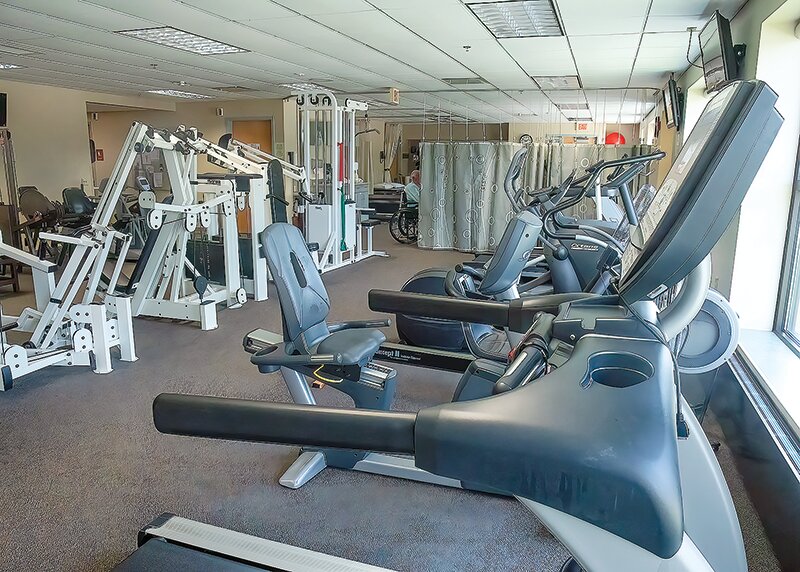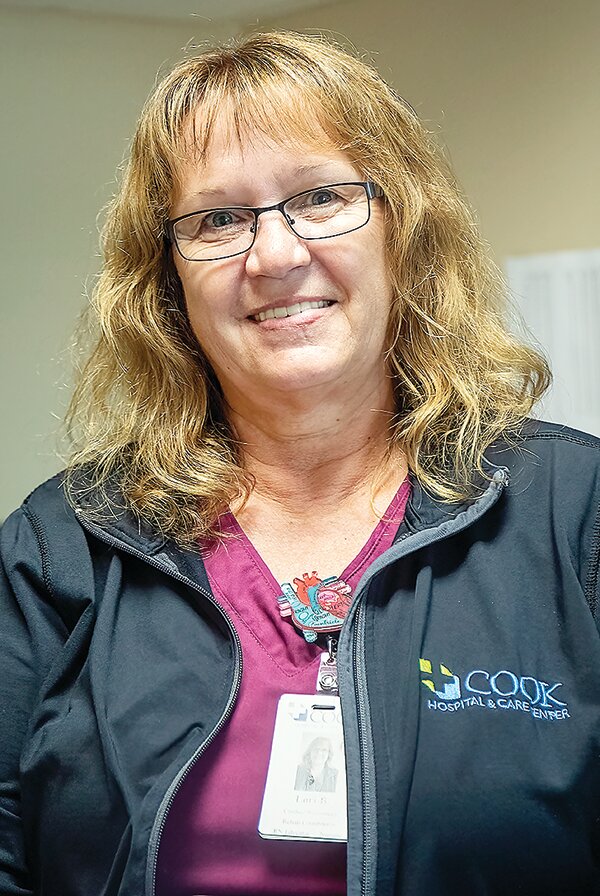Support the Timberjay by making a donation.
Hospital's rehab program is a life-changer
COOK- The Cardiac and Pulmonary Rehabilitation Program is alive and well, and the program’s director, registered nurse Lori Brett, is excited to be writing a new chapter in her 16-year career …
This item is available in full to subscribers.
Attention subscribers
To continue reading, you will need to either log in to your subscriber account, below, or purchase a new subscription.
Please log in to continue |
Hospital's rehab program is a life-changer

COOK- The Cardiac and Pulmonary Rehabilitation Program is alive and well, and the program’s director, registered nurse Lori Brett, is excited to be writing a new chapter in her 16-year career at the hospital.
“I was an EMT for about 17 years up in Orr, and I’m a first responder with the Buyck Fire Department.now,” Brett said. “I’ve worked here for 16 years and started in the hospital emergency room. When this position became available, I applied for it and got it. I really enjoy working with people and one on one kind of. So it’s a chance to really get to understand their health history and what they’re going through. I love the patient contacts and being able to help them.”
Brett said the program benefits patients in a number of ways.
“A big one is improving your quality of life,” she said. “Strengthening your heart and lungs gives you endurance and you’re able to do your activities of daily living and you’re able to do more at home. It can ease depression and anxiety. There are just so many benefits to it.”
Patients are referred by their physicians to the program for a wide variety of heart and respiratory issues. Examples of cardiac conditions the rehab program works with include angina (chest pain), heart attacks, coronary bypass or valve surgery, angioplasty and stent placement, and congestive heart failure. Pulmonary rehab can benefit patients with chronic obstructive pulmonary disease (COPD), post COVID conditions, emphysema, chronic bronchitis, asthma, pulmonary fibrosis, interstitial lung disease, and long cancer.
Brett said that patients have to meet certain criteria to be eligible for the program and for insurance coverage and she works with patients and doctors to determine their eligibility.
“When they are referred they can certainly reach out to their insurance provider,” Brett said. “Otherwise, I have done some checking, too, and I have not had anybody ever turned down.”
Brett said the current patient mix is skewed toward cardiac patients.
“Heart disease is the biggest thing out there, so right now it’s more cardiac,” she said. “But the education and things that I do are very similar for both programs.”
The rehab program combines monitored exercise sessions, patient education and lifestyle coaching that are specifically tailored to each individual’s specific condition. In addition to receiving health information from a person’s physician, Brett conducts an extensive health history to better understand how to design a program specifically for them.
“We go over health history, medications, their diet, their lifestyle,” Brett said. If she discovers a patient has had a diet rich in fried foods, for example, she’ll provide nutritional education to promote healthier choices. Smoking cessation education is another area of emphasis.
“There are so many factors that we work on,” Brett said. “I provide education or put them in contact with resources to help them change their lifestyle."
The rehabilitation activities take place in the hospital’s well-outfitted fitness center, a facility that’s also open to the general public for a monthly fee of $25. The center features a wide array of treadmills and stationary bikes to promote cardiovascular fitness, as well as equipment for strength training and flexibility. Each patient has their own unique mix of equipment and exercises.
“It’s all tailored to their specific needs and disease state,” Brett said. “A lot of people are on weight restrictions. We have several machines that are low impact, and I would start them off slowly on an easy level and wait until they are off weight restrictions to make it a little harder for them and start it out slow and easy and see how they tolerate it.”
A typical cardiac rehabilitation program can ranged from 25 to 36 sessions, depending on what a doctor ordered, Brett said. Those sessions at Cook Hospital are conducted on Mondays and Fridays. Pulmonary rehab programs can be more varied depending on what insurance will pay for, Brett said, but are usually about 18 sessions long. Pulmonary rehab sessions are offered on Tuesdays and Thursdays. Sessions are usually scheduled for the morning hours, but Brett said she has some flexibility with scheduling to accommodate individual needs.
The biggest rewards for Brett from working in the rehabilitation program has been the relationships she’s developed with patients and seeing them thrive.
“Since I’ve started doing this, just to see the progress and the people that I’ve been working with, it’s great,” she said. “And they are all so happy.”
For more information about the cardiac and pulmonary rehabilitation program, call Cook Hospital at 218-666-5945. As a referral is required, patients are encouraged to speak with their physician if they feel the program would be beneficial for them.






